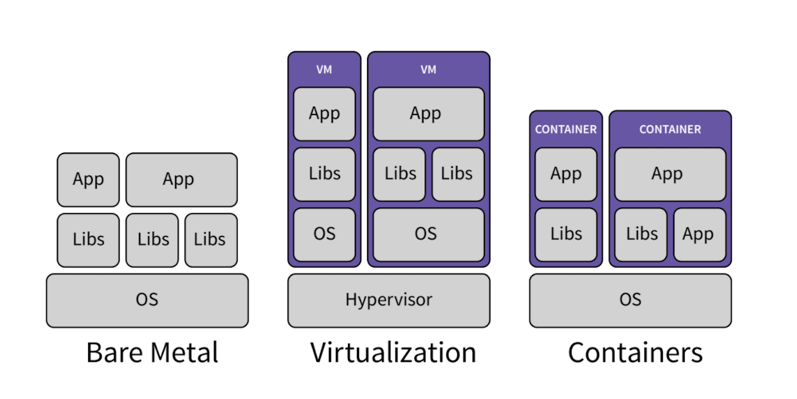PhoenixNAP in most cases deploys a server within 4 hours provided that your order does not contain any special instructions or need an onboard RAID configuration. One of the things that makes Kubernetes so powerful is that it can run virtually anywhere.
 Bare Metal Vs Virtual Machine Compute In Openstack Download Scientific Diagram
Bare Metal Vs Virtual Machine Compute In Openstack Download Scientific Diagram
Although they are both cloud services they provide different levels of offerings.

Bare metal vs vm. Generally speaking organizations today can choose between two types of clouds. Containers on bare-metal hosts get many of the advantages VMs offer but without the drawbacks of virtualization. A good example for that is rollback.
Compared to VMs bare metal is time-consuming to provision Plan wisely as deploying a physical server is not as fast as getting a VM powered up. However the specific performance gains are difficult to calculate. Gain access to bare-metal hardware in apps without relying on pass-through techniques because the app processes run on the same OS as the host server.
With bare metal servers rolling back a machine state is a challenging task. This might sound obvious but its an important distinction in the context of virtualisation. Just because of the sheer volume of solutions out there it is very challenging to generalize and provide a universally truthful answer to which is better a bare metal or cloud solution.
That is fast but not cloud fast. The term bare metal refers to the fact that there is no operating system between the virtualization software and the hardware. As noted above you can sometimes get this access when running a virtual machine but it tends to be more difficult.
A Cloud Server is a virtual machine VM. As mentioned earlier bare metal cloud is a subset of IaaS. Please support me on Patreon.
Have optimal use of. On bare metal servers and virtual machines on-premises or in the public cloud. Bare-metal support means your containerized apps can access special hardware devices on the host.
Often you see specs that the hypervisor and guest OSes take an additional 6 to 12 of the resources in a virtual environment and that can negatively affect container performance. Server setup on bare metal. A Bare Metal server is a physical machine.
Virtual machine - concepts - YouTube. There are pros and cons of running containers on bare metal as well as on VMs. Services on VM vs services on bare metalhost OSHelpful.
As in an actual box in a data centre that you can point at and say that one. Bare metal clouds are essentially physical servers that can be deployed on demand and billed hourly. Bare metal server vs.
Performance is only meaningful if it is consistent. In addition to benefits mentioned above VMs enable users to easily move workloads ie containers between hosts using guest images whereas bare metal machines are more difficult to upgrade or move. Containers running on bare metal utilize system resources more efficiently than VM-based containers.
VM win hands down. When you also throw in all the various use cases into the equation you get a mishmash of advice. During a given period of time a VM may be able to perform more than a bare metal server at its peaks but average out lower overall.
The differences in the way container orchestrators such as Kubernetes work when hosted on bare metal as compared. From a performance and resource utilization perspective containers on bare metal vs. The virtualization software resides on the bare metal or the hard disk of the hardware where the operating system is usually installed.
The answer of course depends on lots of variables. Bare metal can provide consistent performance because the resources dont have any other variable input from other tenants. Home Colocation Bare Metal vs.
By their very nature containers have all the resources they need to run including their own filesystems and network stacks which allows many more containers to be run on the same infrastructure than virtual machines. Whereas bare metal provisioning gives access to virtual resources. These are overlapping categories to an extent because an on-premises cluster could be hosted using bare-metal.
IaaS can be defined as the provision of virtual resources. Access to special hardware. When your apps run on bare metal there is no emulation layer slowing down the app performance.
Traditional clouds offer virtual machines VMs that are extremely easy to use but abstract disk memory and CPU and come with a performance penalty.
